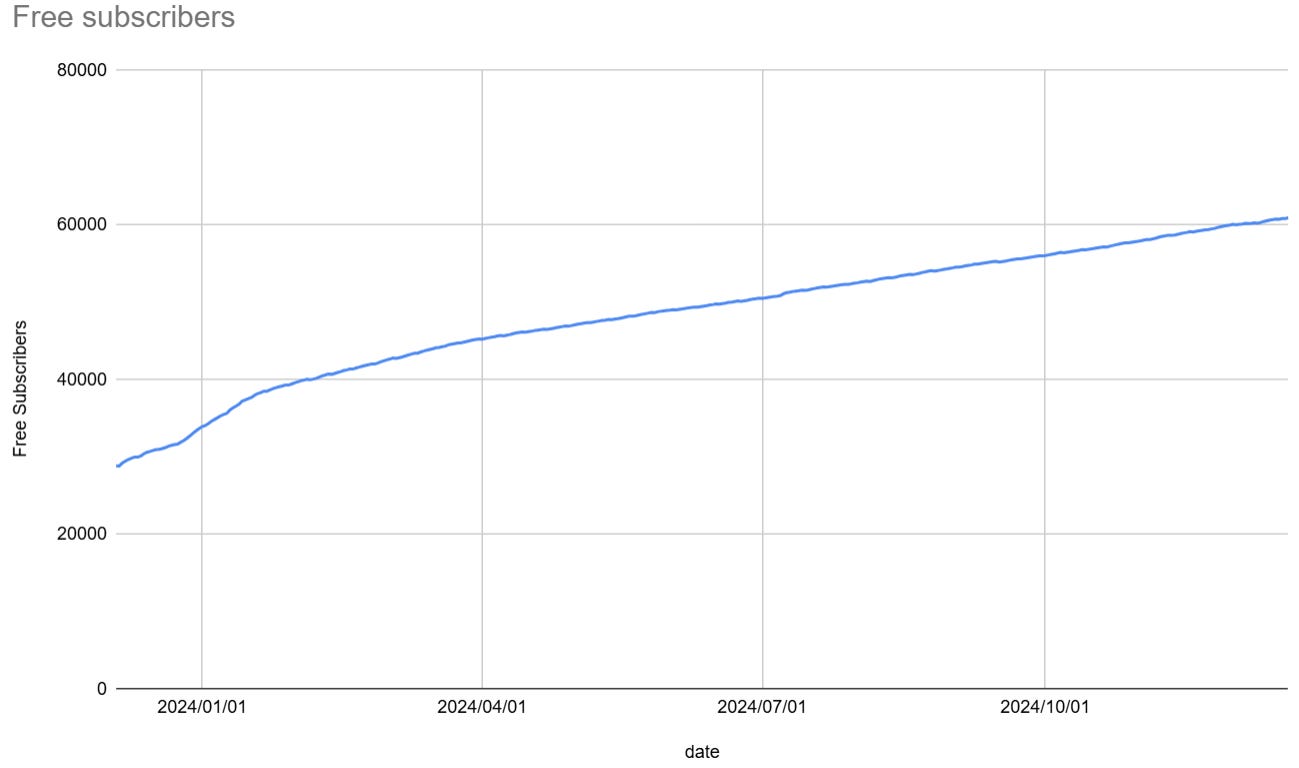My 61k subscriber newsletter, about marketing, and a bit about relationships. An off-topic holiday note from Dave.
An off-topic holiday newsletter. And a happy New Year to you!
Hey there. I’m Dave Anderson. I usually write on the topic of big tech careers. Today is between Christmas and New Years, and I feel like we should all take a deep breath and be off-topic. So that’s what I’m going to do.

Dave and writing.
I’ve written at least one article a week since May 2021. Substack tells me I’ve written a total of 221 articles.
I started writing this newsletter for various reasons. Funny enough, the primary reason was that I wanted to build a habit of consistency. I have been trying to write a fiction novel for 20+ years, and I still haven’t made a ton of progress. I figured if I could learn how to write every week, I could use those new habits to write my novel.
That habit of writing every week did effectively create a newsletter. But my current in-progress fiction novel is only around 10k words. I’m not making a ton of progress.
These days, my articles are often around 4k words, while they were close to 2k words when I started. I think my writing has improved, and I also have more to say. But going back to the math, if we assumed a 3k words average article length, that means in the last 3.5 years, I’ve written around 663k words. The Hobbit is 95k words. The Lord of the Rings is 481k words.
I’m sharing this because this is an article for sharing things. And that’s something I think about a lot.
Maybe a few of you can contact me over comments or email to tell me to write my book :)
The newsletter business with some details.
I moved my newsletter to Substack around a year ago. All in all, my impression is that Substack software has some nice features for writers. And unfortunately, Substack doesn’t help with growth enough so that a writer can just write (which was my dream).
I moved to Substack around last December, and I continued my normal social media marketing writing (where I get most of my newsletter growth) through around April 2024.
And then I decided I was a bit tired of writing social media. Besides, I’d moved to Substack! Perhaps I could just stop writing social media, and things would be fine. So I stopped writing social media, and just wrote my weekly articles. I’d write on social media occasionally, but not at all consistently.
I figured this was a good test of what social media does for my newsletter. And a decent test of how Substack might help a paid newsletter grow.
Meh, Substack paid growth might exist, but it’s nothing compared to social media. When not writing social media, I lost around 1.5% of my subscriber base each month. It just consistently shrank. Not a huge deal, as I’m not living on this income, but it’s annoying to see your business shrink.
Now, it’s not like I was sitting around crying about it. I’m training for another ultra marathon. We travel a dozen times a year. I spend a ton of time with our kids, and I built a sauna. I was simply spending less time on the newsletter business. It was a tradeoff I was happy making.
A few weeks ago, I decided that I’d run the test long enough (and I was sufficiently motivated to spend more time marketing), and I started writing on social media again. I use Buffer (as I did before), write content, and then have it post on all my social media platforms (LinkedIn, Bluesky, X, Threads). LinkedIn is the only one with real value, but I decided to keep posting on other platforms, just in case.
What’s cool about data is that you can clearly see my consistent growth through April. And then the steady drop after I stopped consistently writing on social media. And then a few weeks ago, you can see what happened when I started writing on social media again.
We’ll see how things continue in the new year. In the past, I sometimes wrote on social media 7 days a week. Sometimes I wrote 5 days a week. Right now, I have 3 days a week of posts going out (on the Buffer schedule). I’m deeply curious to see how well this works because writing 3 pieces of content a week is less work than 7. And I’m trying to minimize my time spent marketing.
Interestingly, my free list continued to grow at a linear rate of around 2000 free subscribers every month. Looking at that free list graph, it looks absolutely unrelated to anything I do.
You can see a bit of a steeper upward curve during the first few weeks on Substack, and then incredibly consistent growth. I can write a viral post on LinkedIn (with many new paid subscribers), and no bump in that graph. It’s just consistent growth.
I assume it’s because several popular newsletters on Substack recommend my newsletter, and Substack recommendations simply work.
Brief segue into marketing.
Isn’t that a cool word? Segue? I initially wrote Segway, but that’s the wheeled scooter things. I hate to admit that I had to look up the proper spelling.
Anyway, as a related topic to my newsletter business, I have to focus on marketing. Posts on LinkedIn are the main source of my new paid subscribers. Here are a few posts which became relatively popular.
What do I take away from this? People have opinions in their heads, and get excited when someone else is saying what they already think. For the above (for example):
“Amazon is mean and rude to their employees.”
“Don’t measure how much I’m getting done!”
“I’m lazy, but I’m still a good person.”
So perhaps marketing works when your message is what people want to hear.
What’s also funny is that I don’t view the 61k free subscribers as a particularly valuable number. But I put it in my headline because it’s a big, impressive number, and it might get people’s attention.
See, look at that. I did some marketing. I don’t know about you, but I really don’t enjoy marketing. It’s a necessary evil.
Thinking about others and relationships.
It’s the holidays, so it’s a good time to reflect on how we treat others.
On a flight to visit family, I was listening to a podcast where David Roche (famous Ultra runner and coach) was talking about how his mental health was impacted by some harsh, negative commentary directed his way. It felt wrong, considering how he seems genuinely passionate about helping others, loves others in his sport, and seems like a nice, friendly family guy with kids.
It immediately reminded me of how Amir Satvat won the Game Changers award at The Game Awards for his work helping laid off game developers find new jobs. While most people were thrilled for him (and thankful for his work), there were trolls trying to tear him down. If you know Amir at all, you’d realize he’s an absolute gem of a human.
Another example is Marques Brownlee, a seemingly interesting, smart, and fun tech reviewer, who was caught speeding in a car in a video. He took down the video and apologized. You’d think the world would move on. But if he’s mentioned anywhere online, the trolls line up to yell about him speeding.
Humans love to tear other humans down. There are many psychological reasons it seems to make us happy. But I’m going to mention one factor which makes it so much worse. It’s so much easier to insult and complain about someone we don’t actually know.
We’ll see surface information which suggests something bad.
David Roche was sponsored by an energy gel company, which later was found to have incorrect nutrition labels. As if he would do a lab test before accepting a sponsorship agreement. It’s got to be rough to finance a living out of running long distances.
Amir works at Tencent, a game development company which was laying off the very people he was trying to help. Although he was helping them before he got the Tencent job, and is doing it on his private time, unrelated to his job.
Marques did indeed speed, which is a dangerous thing people shouldn’t do. But do you know anyone who never speeds? Or never made poor decisions they regret later?
But these random internet people don’t actually know them, or their motivations. In my experience, what you’ll swiftly find is that almost everyone you complain about is a pretty decent human once you get to know them.
At Amazon, I ran into this countless times. I'd finally meet the pain in the *** manager who was avoiding my team's work. Instead of the jerk I imagined, they had their team / personal challenges they were dealing with, and we'd simply communicated poorly. It wasn't an evil person. It was just another human doing their best.
I decided that this was a pretty good holiday message to think about.
Behind every lazy employee or selfish manager or ignorant product manager is a pretty great human. And if you got to know them, there's a good chance you'd like them. Or at least you'd think twice before calling them names behind their back.
Have a great holiday!
I’m writing this while hanging out with family before Christmas, and we’re looking at a relatively busy set of days hanging out with family and friends, flying, and perhaps even some relaxing.
I hope you take the time over the holidays to think about what motivates you. I wrote about my writing, and how I think about money, and my hobby business. What do you think about? What do you want to accomplish over the next few years, and is there anything you can do over the holidays to make some progress?




